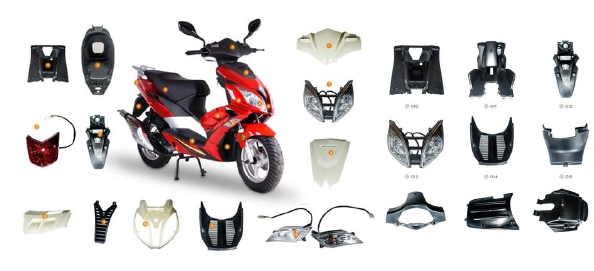As the electric vehicle (EV) market in Pakistan continues to grow, driven by various factors, we recognize the need for standardization to promote economies of scale, enhance product quality, and provide greater consumer convenience. In this regard, we would like to propose the standardization of the following key components across electric vehicle manufacturers:
- Wheel Hub Electric Motors
- Lithium Batteries
- Inverters
- Controllers
- Switches
- Metal Parts
- Common battery sizes and voltages for all products
- Uniform tire sizes
- Interchangeable electric components (inverter, controller, switches)
This standardization will enable vendors to develop compatible electric motorcycle scooter kits and parts, such as:
- Wheel hub motors
- Batteries
- Inverters
- Controllers
- Switches
- Tyres
- Frames
- Metal parts
- Rubber Parts
- Wire Harness
- Cables
History of Standardized Common Parts of Conventional Gasoline Motorcycles in Pakistan
In 2003, motorcycle production and sales in Pakistan were at 100,000 units. With the establishment of new motorcycle factories and the adoption of standardized common parts, production and sales have surged to over two million units. All OEMs began producing 70cc, 100cc, and 125cc motorcycles using common parts, with vendors manufacturing and supplying these parts across the board. This standardization led to increased production volumes, a reduction in prices, and ultimately, significant benefits for end users. We propose applying this same strategy to electric motorcycle scooters to drive production, sales, and cost reductions for the benefit of consumers.
Benefits of Standardization
For the Industry:
- Increased production volumes
- Reduced production costs
- Improved quality control
- Enhanced competitiveness
- Streamlined supply chain management
For Consumers:
- Standard warranties and guarantees across brands
- Easier access to replacement parts and repairs
- Reduced maintenance costs
- Improved performance and safety
- Increased consumer confidence
Standardization Parameters
To ensure compatibility and efficiency, we suggest standardizing the following:
- Specifications
- Design
- Sizes
- Performance criteria
Implementation Roadmap
We recommend the following steps for successful implementation:
- Formation of a technical committee comprising industry stakeholders
- Definition of standardization parameters
- Development of standardized component specifications
- Industry-wide adoption and implementation
By introducing these standardized components, we can create a more efficient, competitive, and consumer-friendly electric vehicle industry in Pakistan. Furthermore, this approach will support the localization and development of electric motorcycle scooters, boosting local manufacturing, creating jobs, and reducing overall production costs.
The Growing EV Market: Challenges and Opportunities
As over 100 assemblers prepare to enter the market with electric bikes, we face both challenges and opportunities. Standardization will be critical to addressing issues related to quality control, market competition, and potential market saturation, while opening up avenues for job creation, market education, and infrastructure development.
Why Standardization is Essential
Standardization of EV bikes in Pakistan is critical for ensuring safety, quality, and a seamless user experience. By defining common technical specifications, safety requirements, and performance benchmarks, we can facilitate the integration of e-bikes into the broader transportation system. Key benefits include:
- Safety Assurance: Establishing safety benchmarks ensures quality and prevents accidents caused by substandard manufacturing.
- Interoperability of Charging Infrastructure: Standardized charging protocols will allow users to charge e-bikes at various stations across the country, promoting accessibility.
- Quality Assurance: Standardization ensures that all electric bikes meet high-quality standards, leveling the playing field for manufacturers.
- Market Growth: Clear standards will encourage new players to enter the market, fostering healthy competition and innovation.
- Consumer Confidence: Consumers will feel confident knowing their e-bikes meet standardized safety and performance criteria.
Steps Toward Standardization in Pakistan
- Regulatory Framework: The government should establish a comprehensive regulatory framework that includes safety standards, technical specifications, and certification processes.
- Industry Collaboration: Manufacturers, suppliers, and other stakeholders should work together to define common standards and address challenges collectively.
- Consumer Education: Raising awareness about the benefits of standardized products is key to helping consumers make informed purchasing decisions.
- Incentives and Support: The government can encourage adoption through financial incentives, tax breaks, and research grants for manufacturers who comply with standardization guidelines.
By embracing standardization, Pakistan can lead the way in building a sustainable and competitive electric vehicle industry.
Thank you for considering our proposals. I look forward to further discussions on how we can contribute to the success of the upcoming policy and subsidy program for electric motorcycle scooters.
Exclusive written by Muhammad Yousuf Shaikh for Automark magazine’s November-2024 printed/digital edition
Chairman, Pakistan China Motorcycle Industry Council (PCMIC)
